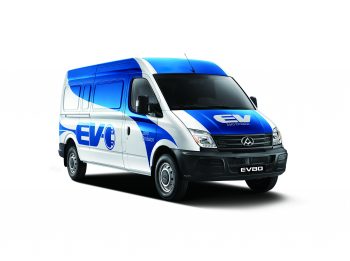Comment: Is now the right time for fleets to switch to electric driving?
For many of us the recent pandemic has allowed for more time to focus on business planning and strategy and that includes time to assess what switching to electric driving means for you and your fleet. Use this time to find out if your business is ready to make the switch to EV, says Mark Barrett, general manager of Harris Automotive Distributors (Maxus).

Gearing up for the change is 90% of the journey, according to Maxus
Experts estimate that there will be 140 million electric vehicles on the road globally by the end of the decade as a direct result of governments signing the 2030 Paris Climate Agreement.
This means that in the next 10 years, combustion engines will be phased out and everyone – businesses included – will have to think practically and seriously about greener transport options.
Maxus, formerly LDV, has become a favourite with business owners and fleet managers across the UK who want to make the switch to electric LCVs. The range, reliability and versatility of Maxus vans are key to their popularity, but most important is its focus on customer service and the support customers get from the Maxus dealership.
Maxus is distributed by Harris Automotive Distributors and is supported by a nationwide dealership network across all seven territories in right-hand drive markets in Europe. It believes that offering a specialised service that helps customers navigate the switch to electric driving is an integral part of the business.
Speaking about the company’s approach to customers considering making the switch to electric, Mark Barrett, general manager of Harris Automotive Distributors, said: “Changing to a zero-emission vehicle or LCV fleet isn’t as simple as handing over a cheque and charging up. Our dedicated teams help every customer understand what’s involved in making the switch, from start to finish and specific to their business and transport needs.
“Gearing up for the change is 90% of the journey. Travel range, charging infrastructure, the total cost of ownership, grants, tax breaks, location and business logistics all come into play and Maxus takes each into consideration when advising customers. Not everyone who contacts us is ready to make the switch to electric. For some, it might be a year down the line, for others, longer; but public charging infrastructure will be a key part to the transition. Maxus supports its customers and future customers by assessing what they need to do before purchasing their first EV.”
Each customer has different requirements, and many have different obstacles to overcome. “Buying an EV is a great move for most businesses,” says Mark Barrett, “but what if most of your drivers live in apartments with no charging facilities? This is just one of the many, many issues that fleet buyers and business owners have to consider when thinking about purchasing one or multiple EVs. We support them so that they can be confident in their final decision.”
Charging infrastructure can often be the hardest hurdle to overcome. Some companies may need to invest in charging facilities at the business premises before being ready to take on an EV fleet; others may need to look at the practical implications of employees taking their vans home. But even that can have its problems, as Barrett explains: “Businesses that rent rather than own a premises might run into issues when trying to install extensive on-site charging facilities. The alternative is an assessment on the feasibility of employees charging at home. If your drivers have dedicated off-road parking, they may qualify for an OLEV grant, which will give £500 towards installing a home charge point. But again, this is easier for homeowners compared to those who live in rented properties. A lot to think about.
“Notwithstanding the challenges, most obstacles can be overcome, so I would encourage business owners and fleet buyers to talk to us as we can help you find practical solutions for your business. Sometimes, it might mean holding off on your EV plans for a few months or even a year or two; but we believe in being open and honest with our customers. There is little point in purchasing a fleet of EV vans if your business is not ready and our aim is to have satisfied customers. Added frustration is not part of our service.”
With Covid-19 forcing the world to slow down, now is the time for businesses to take the time to consider the environment and plan their future – and there is no doubt that the future is electric. “If Covid-19 has taught us anything, it is that nothing should be taken for granted,” says Barrett, adding: “Planes, trains and automobiles have ground to a halt for the most part and many manufacturing plants have had to close temporarily. This has allowed our environment to start to heal and going electric will help continue this process in the long-term.”
Speaking about what business owners and fleet managers can do right now to prepare for greener driving, Barrett says: “People can use this time to their advantage and plan for the inevitable switch to electric transport. Now is the time to ask all the questions and gear up to go green. Start devising a strategy that will guide the way towards electrification. Undertake a feasibility study and find out what the benefits are to your organisation and employees, research and develop workplace policies that support your move to greener driving. And remember, you don’t have to do this alone. Get in touch with the experts in this area, we are happy to help with any questions you have.”

















